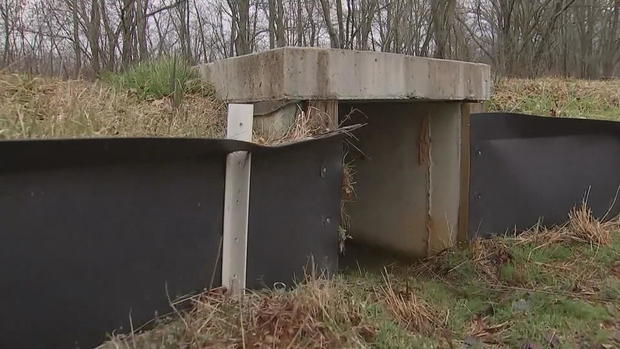UPPER FREEHOLD TOWNSHIP, N.J. (CBS) – The New Jersey Department of Environmental Protection (NJDEP) is building wildlife tunnels underneath roadways to prevent cars from hitting and killing animals.
The tunnels are part of the Connecting Habitat Across New Jersey (CHANJ) program, which utilizes a combination of newly-constructed tunnels and existing storm culverts to allow different wildlife species to safely cross underneath roads to different habitats.
According to New Jersey Fish and Wildlife‘s Dave Golden, the ability of animals to move to different habitats is necessary for their survival.
“As humans continue to dominate the landscape in New Jersey, we need to figure out ways to better protect our wildlife,” Golden said. “Therefore, they need to be able to move throughout our landscape, which has been greatly broken up and fragmented not only by development but by roads.”
NJDEP built two wildlife tunnels at Assunpink Wildlife Management Area in central New Jersey to allow amphibians and reptiles — like turtles, snakes and frogs — to safely cross the road.
“As you look through here, there’s lighting that can shine through because we have grates over top,” Golden said. “That’s an important design element for these culverts.”
Fencing on both sides of the culverts’ entrances channels animals into the tunnels.
“We installed these in 2019,” Golden said. “Within the fenced area, we’ve had almost 100% reduction in wildlife mortality along the road.”
New Jersey plans more projects statewide to reduce wildlife mortality.
Besides building custom culverts, the state is building fencing along major highways like the Atlantic City Expressway to guide wildlife toward pre-existing culverts built for storm management.
“The rationale for doing this is based on a growing understanding that roads have a real impact on wildlife populations,” Golden said.
Besides roads, climate change is also having an impact on wildlife populations.
As Earth’s temperatures warm up, humans travel on roads like the Atlantic City Expressway to places like the Jersey Shore to cool down in the ocean.
The very same roads block animals from migrating north to cooler places, in the era of climate change, that are now better suited to breed and forage.
“If we don’t maintain connectivity in New Jersey, then climate change has an even greater impact on species,” Golden said. “They’re not able to find the temperatures and the climates that they need to be successful.”
Like the roads that connect people, NJDEP commissioner Shawn LaTourette said humans’ actions are a direct path to what happens to the environment.
“We need our environment to ensure good health, to ensure public safety and ensure that we can enjoy this world that we share,” LaTourette said.


